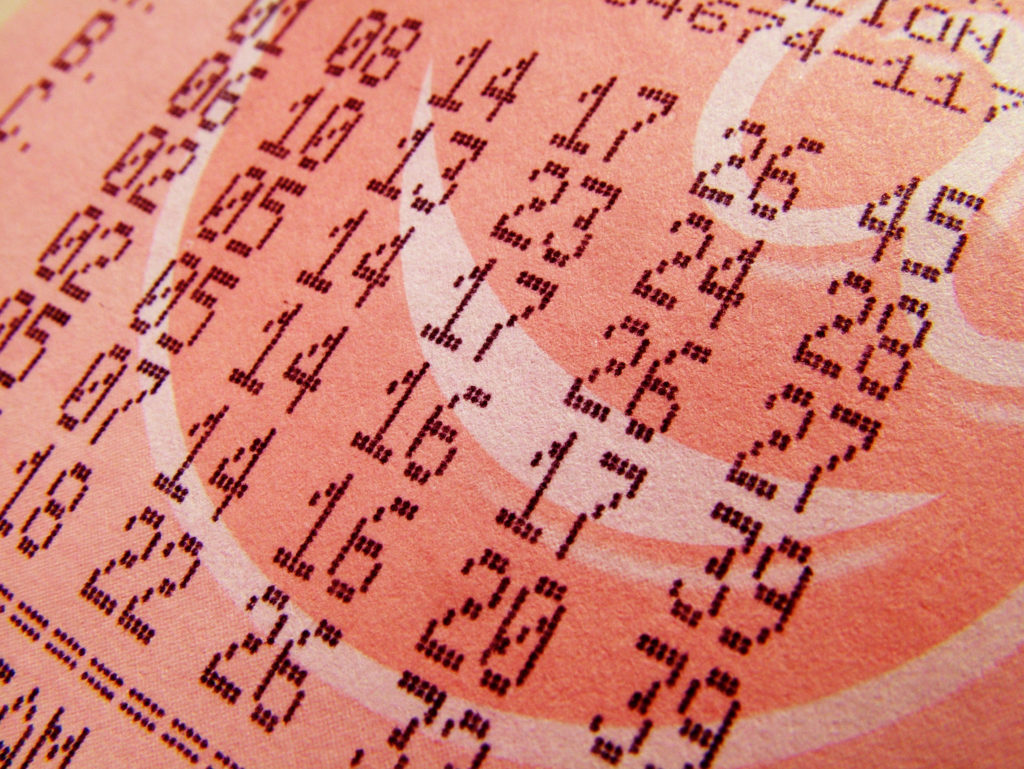 One cannot talk about the lottery in a literary context without a tip of the hat to Shirley Jackson’s infamously dystopian story, which received an “incredibly misleading” pulp cover treatment back in 1950 and was more recently reimagined in the comically brief form of the fortune cookie by Jean-Luc Bouchard: “Expect an invitation to an exciting event.” A quick web search of “The Lottery” turns up no shortage of adaptations of Jackson’s story, and a search through our own archives yields a wonderful array of stories showcasing the appeal and versatility of the lottery as a literary trope, covering a range of topics such as the ethics of the Florida Lottery, one family’s struggle with the allocation of public housing, and a classic NFL football play reenactment.
One cannot talk about the lottery in a literary context without a tip of the hat to Shirley Jackson’s infamously dystopian story, which received an “incredibly misleading” pulp cover treatment back in 1950 and was more recently reimagined in the comically brief form of the fortune cookie by Jean-Luc Bouchard: “Expect an invitation to an exciting event.” A quick web search of “The Lottery” turns up no shortage of adaptations of Jackson’s story, and a search through our own archives yields a wonderful array of stories showcasing the appeal and versatility of the lottery as a literary trope, covering a range of topics such as the ethics of the Florida Lottery, one family’s struggle with the allocation of public housing, and a classic NFL football play reenactment.
Let’s begin with the Review’s most recent presentation of this timeless game of chance, Camille Bordas’s “The Lottery in Almería,” which appears in issue no. 237:
Andrés played the European lottery every Tuesday and Friday, and the charity lottery to benefit the visually impaired on Mondays and Wednesdays. He played the national Christmas lottery every Christmas, too, but that didn’t mean much: everyone in Spain, even the king, played the Christmas lottery. Most every Spaniard, too, could be guilted into buying a ticket from a tired blind man once in a while—they were all around, these blind men, hamming it up by wearing socks that didn’t match, bumping into your café table while they tried to sell you your lucky number, or stationary behind their street kiosks, their long faces not easy to ignore when you were having a good day. But the European lottery, that was Andrés’s little guilty pleasure.
Issue no. 214 sees the implementation of an absurdly elaborate lottery drum in Chris Bachelder’s “The Throwback Special: Part 2”:
Really, any container of appropriate size would have worked just fine. An ice bucket, a duffel bag, an empty case of beer. Just something large enough to hold twenty-two Ping-Pong balls. In the early years, the men used whatever was handy, and there were never any problems. But eight or nine years ago, Steven showed up with a huge lottery drum that he had built in his basement. The spinning drum rested on a detachable metal frame constructed of heavy metal poles that screwed together. The drum itself was a plexiglass barrel with a small latched door on one end and a superfluously large crank on the opposite end. The barrel would have held four hundred Ping-Pong balls. The commissioner spun the drum with the crank, then unlatched the door, reached into the barrel (often up to his shoulder), and drew out a ball on which was written one of the men’s names.
In “Will and Lou’s Boy,” from issue no. 96, Rose Tremain writes:
Then we heard about the housing lottery. The coming of the news about the housing lottery was like the coming of malaria. Lou began to sweat. It was like the jungle had suddenly surrounded her.
And William Ferguson deals with similar concerns in “Dies Irae, Morrissey,” from issue no. 90:
Raquel has just won the lottery. It’s a small amount compared to the grand prize, but large enough to pay off the second mortgage and have quite a bit left over. The strange thing is that she had no premonition of success, and she’s famous for the accuracy of her premonitions. I’m glad but terrified at the same time, I mean I’m afraid of our winnings because they seem to hint at a breakdown in other areas; I feel naked, alone, as if everyone had abandoned us…
Michael LaPointe addresses the exploitation inherent in monetary lotteries in his essay “Unlucky Numbers” from the Daily:
Just as lottery play tracks along class lines, so does it have a racial skew. A study of the Virginia lottery showed that 61 percent of its sales are made to just 8 percent of the total population, and more than one in three of that very small slice are Black. It remains an open question whether lotteries intensify marketing campaigns in Black communities—and how effective such campaigns would be—but it’s indisputable that the business would crumble without players like Abraham Shakespeare.
Let’s let Miranda July take us out with some wisdom from her story “Birthmark,” in issue no. 165:
Have you ever wanted something very badly and then gotten it. Then you know that winning is many things, but it is never the thing you thought it would be. Poor people who win the lottery do not become rich people. They become poor people who won the lottery.
If you enjoyed the above, don’t forget to subscribe! In addition to four print issues per year, you’ll also receive complete digital access to our sixty-eight years’ worth of archives.
Christopher Notarnicola is a veteran of the U.S. Marine Corps and holds an M.F.A. from Florida Atlantic University. His work was featured in The Best American Essays 2017 and has been published in Bellevue Literary Review, Consequence Magazine, Image, North American Review, The Southampton Review, and elsewhere. Find him in Pompano Beach, Florida, and at christophernotarnicola.com.
from The Paris Review https://ift.tt/2Ti9NqH
Comments
Post a Comment